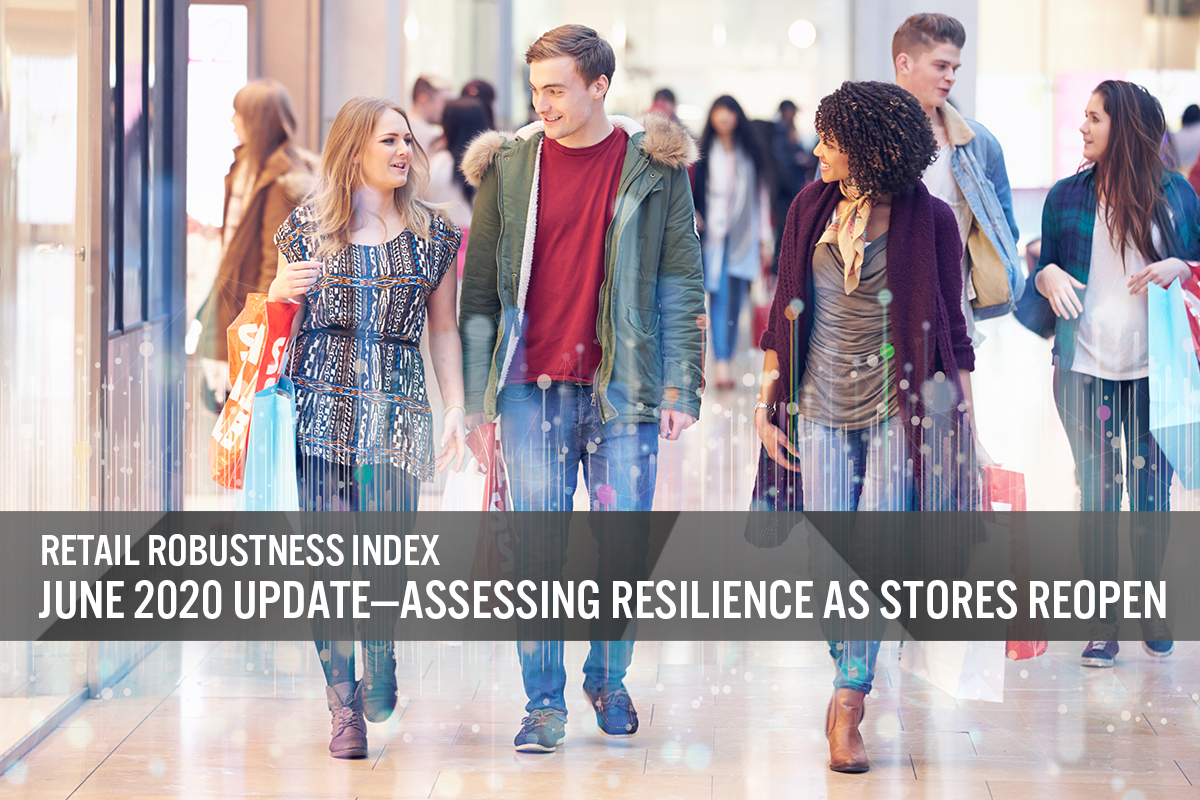
Nitheesh NH
This report presents Coresight Research’s new Coronavirus Retail Robustness Index, which evaluates the 100 largest US retailers (by revenue) on their ability to weather the dramatic demand shifts due to the ongoing coronavirus outbreak in the US.
We evaluate retailers based on financial strength; whether they sell products offline, online and internationally; and on the length of tenure of the CEO.
Figure 1 presents the 10 retailers that rank highest in our index as of the start of May 2020, of which one is a new entrant to the top-10 ranking.
Figure 1. Changes in Coronavirus Retail Robustness Index: Top 10 Retailers
[wpdatatable id=205]
Source: Company reports/Coresight Research
Commentary on Score Changes- The average score across the full index rose to 45.8 from 44.8 previously. This is due to a 7.0-point increase in the “offline capacity and online penetration” metric as many stores are being reopened, partially offset by an average 5.9-point decline in financial health. Changes in financial health and from store reopenings accounted for the majority of score changes.
- As store closures did not begin until March, they will not have fully impacted results for the first fiscal quarter (which typically closes at the end of April and for which many retailers have not yet reported)—although closures were in full force through the month of April. The second quarter therefore started with brick-and-mortar retail being largely shut down in the US—primarily due to closures in discretionary sectors—so closures are likely to have a substantial effect on second-quarter results. However, as of mid-May, many retailers had started to implement at least partial reopenings as states ease lockdown measures.
- Some retailers saw more pronounced score changes, which we outline below.
- Largest increases:
- Shoe Carnival (increase of 17 points): 79-point increase in offline capacity due to having reopened 80% of its stores, partially offset by a 14-point decline in financial health.
- American Eagle Outfitters (increase of 10 points): 39-point increase in offline capacity due to plans to reopen 600 of its 1,000 stores by May 31.
- Express (increase of 10 points): 9-point increase in financial health plus a 33-point increase in offline capacity (plans to reopen 300 stores).
- Sportsman’s Warehouse (increase of 10 points): 48-point increase in offline capacity due to store openings, partially offset by an 11-point decrease in financial health.
- Largest decrease:
- Container Store (decrease of 15 points): 21-point drop in financial health.
- Largest increases:
- Multiplied the scores by 10 for easier comparison (now on a scale of 0–100, versus 0–10 previously)
- Updated financial health scores based on recent earnings reports
- Updated offline capacity scores based on store-reopening figures from company announcements
- Stage Stores filed for bankruptcy protection on May 11, JCPenney on May 15 and Tuesday Morning on May 27; all have been removed from the index.
- Retailer financial health (20%): Represents a retailer’s financial state and ability to handle financial challenges. Commentary: Many retailers have subsequently drawn on their credit lines and/or issued debt offerings and reduced expenditures, which bolsters their financial position. One component of this score is the market value of a company’s stock, which affects its ability to raise additional capital.
- International exposure (15%): Reflects the percentage of revenues generated internationally versus in North America. Commentary: With different geographies confronting different levels of disruption due to the outbreak, companies with international exposure should have more supply-chain options and less exposure to—and thus less reliance on—the North American market.
- Offline capacity and online penetration (25%): Represents a retailer’s ability to sell products offline and online. Commentary: Due to the widespread wave of store closures, many retailers have scrambled to expand their online businesses, which represented their only source of revenue. Scores are now being boosted by the slow return to brick-and-mortar retail, as lockdowns ease and stores are permitted to reopen.
- Product mix (20%): Determines the relative benefit of a retailer’s product categories. Commentary: Retailers such as Target and Walmart that offer staples and health and wellness products (whose stores have remained open) should see steady revenues, although the product mix is currently highly skewed towards staples. Retailers have reported strong sales of grocery and health and wellness products during the coronavirus crisis.
- Management tenure (20%): Reflects the number of years that the CEO has served in the position. Commentary: CEOs who have occupied their positions for longer should be better acquainted with the company and better equipped to navigate the current environment.
Source: Coresight Research
Notes on the Coresight Research Coronavirus Retail Robustness Index:- The index is a model for retailer robustness and as such relies on certain assumptions and estimates.
- The environment is evolving dramatically at a fast pace: Figures are thought to be accurate as of writing but may change as companies continue to report quarterly earnings.
- The index is not a predictor of retailer future financial health.
Source: Company reports/Coresight Research